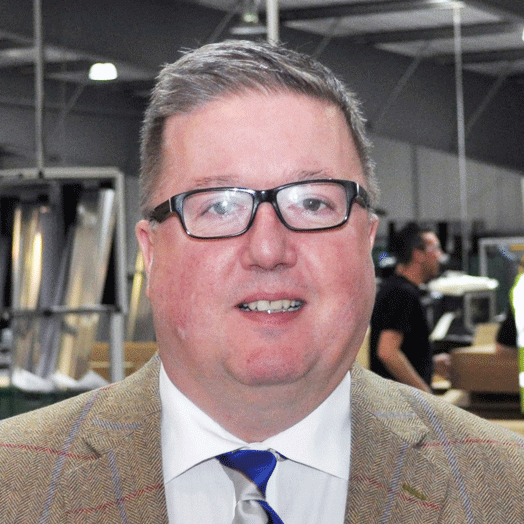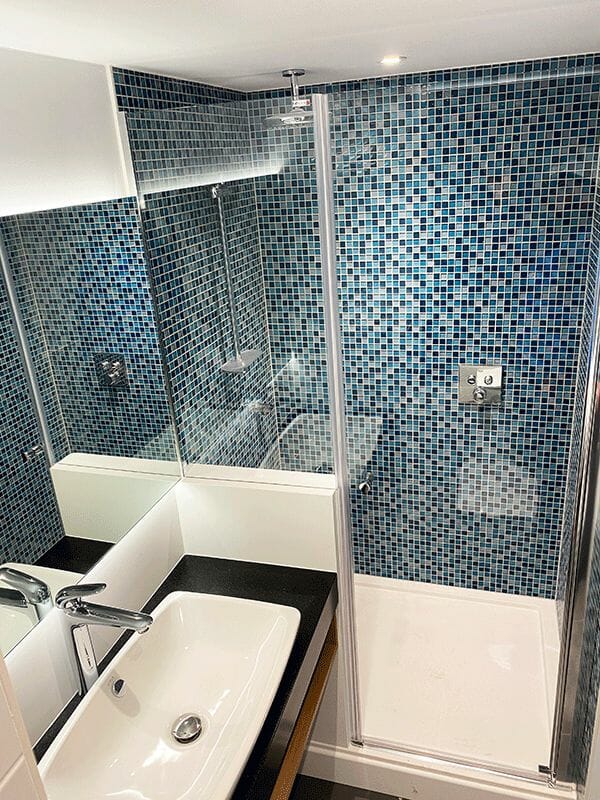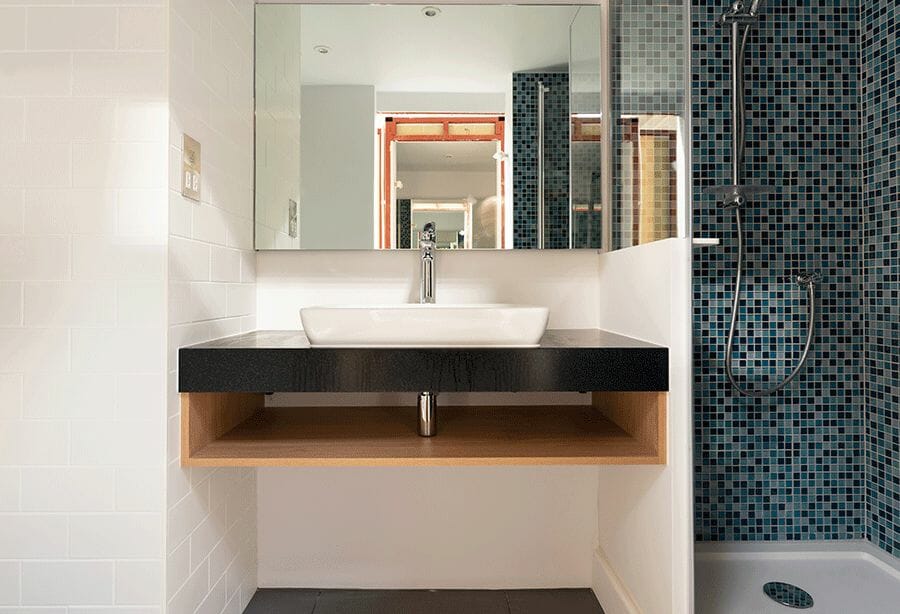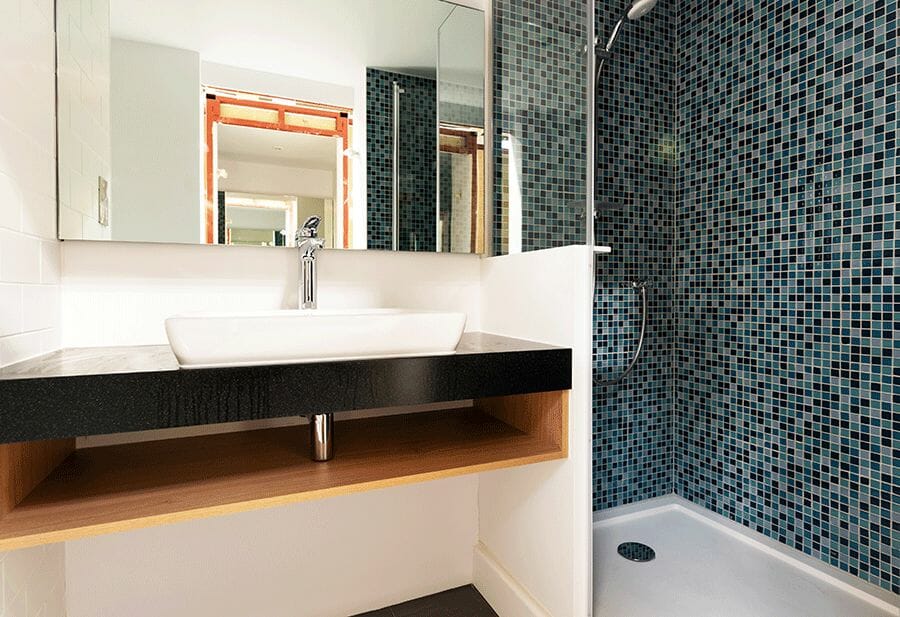Modular Bathroom Case Study: Holiday Inn, Dublin Airport

David Osborne is the CEO of Roman Showers Ltd, the largest shower enclosure manufacturer in the UK and Europe, based in the north east of England. Roman has developed specialist capabilities to manufacture anti-slip solid surface shower pans and to fabricate solid surface vanity tops which integrate with the showering space. Roman exports around the world to 63 countries currently and is constantly developing systems for modular manufacturers and international hotel groups.
Roman, Europe and the UK’s largest shower enclosure designer and manufacturer, offers designer showering solutions for the bathroom within the hospitality and residential markets; are firmly embedded with key international hotel groups, architects and designers worldwide; and currently operate in over 60 international markets. All products are made in Britain on a 400,000 square feet manufacturing operation in County Durham. Roman is a capability driven manufacturer with all design in-house; an enclosure factory; a solid surface moulding facility; and a Corian fabrication plant.
Overview
As the leading company who designs and manufactures numerous elements of the bathroom which are all designed from the ground up to integrate together, Roman were contracted by Irish bathroom pod manufacturer, Castle Modular, to supply shower enclosures, anti-slip solid surface shower trays and integrated Corian vanity units for the prestigious IHG Dublin Airport Holiday Inn.
The project involved the supply of 400 bathroom pods by Castle Modular to the main contractor Stewart Construction. The ability to source from an accredited IHG manufacturer who had the skill sets to bring these items together with the necessary CE Marking accreditations, declarations of performance and industry leading service backed guarantees was fundamental to the
purchasing decision.
Product Specification
All products supplied adhered to IHG’s Holiday Inn brand standards. Roman liaise closely with the IHG Group to develop concepts together across a number of their brands.

An inside look at Roman's newly-installed modular bathroom pods at under-construction IHG Dublin Airport Holiday Inn.
Related Listening:
The Evolution and Future of Modular Showers w/ Roman Ltd.
In this episode, David Osborne, CEO of UK-based Roman Ltd., speaks about the growth of the international modular shower industry, how modular showers themselves have evolved, and the trends that will define the industry over the next few years.
The unique Holiday Inn design involved the fabrication of a nib wall which integrated with the tray and vanity unit. The bespoke glass panel affixed to the wall allowed for a bright, fresh, open looking enclosure when combined with the frameless toughened glass pivot door.
The design brief also called for a bottle shelf to be included which was seamlessly formed onto the solid surface wall.
Integral to the design was the modular way in which all items were constructed to create a water tight contemporary shower enclosure for the guest to safely enjoy. Critically the products are also easy to clean and maintain. Roman designed and developed a unique leg riser kit for the shower tray with six robust adjustable feet to allow for ease of levelling which also offered a rigid platform on which to stand.
Due to the nature of bathroom pod construction methods, sufficient space was allowed beneath the shower tray to accommodate the drain and waste pipe. For ongoing maintenance, a solid surface facial plate was fixed to the front of the tray to enable quick and easy access to the fast flow waste.
In line with IHG Brand standards, Roman manufactured a solid surface shower tray in a matte white finish which has a DIN Class C anti-slip rating. This unique material cannot wear and offers a stunning permanent anti-slip surface.
Result
Working in tandem with Castle Modular’s construction, design and commercial teams, 400 stunning bathroom pods were supplied on time and on budget in what will be one of IHG’s largest new-build hotels in Europe.


More from Modular Advantage
AoRa Development Aims for New York’s First Triple Net Zero Building Using Modular Methods
More cities are providing funding for newer infrastructure projects as long as they meet sustainability requirements. This is how modular can fit the bill, thanks to its lower waste production.
Developers and Designers: Lessons Learned with Modular Design
Modular construction is attractive to many developers because sitework and module construction can occur simultaneously, shortening the schedule and reducing additional costs.
UTILE: Putting Modular Building on a Fast Track
In Quebec, UTILE is taking the lead in creating affordable modular buildings to help decrease the student housing shortage. During the process, the company discovered what it takes to make the transition to modular building a success.
Sobha Modular Teaches Developers How to Think Like Manufacturers
With its 2.7 million square foot factory in UAE, Sobha Modular is bringing both its high-end bathroom pods to high-end residences to Dubai while developing modular projects for the U.S. and Australia.
RoadMasters: Why Early Transport Planning is Make-or-Break in Modular Construction
In modular construction, transportation is often called the “missing link.” While it rarely stops a project outright, poor planning can trigger costly delays, rerouting, and budget overruns.
Navigating Risk in Commercial Real Estate and Modular Construction: Insights from a 44-Year Industry Veteran
Modular projects involve manufacturing, transportation, and on-site assembly. Developers must understand exactly what they are responsible for versus what they subcontract. Risk advisors should research the developer’s contractors, subcontractors, and design-build consultants—especially the modular manufacturer.
Art²Park – A Creative Application of Modular and Conventional Construction
Art²Park is more than a park building—it’s a demonstration of what modular construction can achieve when thoughtfully integrated with traditional materials. The use of shipping containers provided not only speed and sustainability benefits but also a powerful structural core that simplified and strengthened the rest of the building.
Building Smarter: A New Standard in Modular Construction Efficiency
Rising material prices, labour shortages, expensive financing and tightening environmental rules have made conventional construction slower, costlier, and more unpredictable. To keep projects on schedule and within budget, builders are increasingly turning to smarter industrialized methods.
Resia: Breaking All the Rules
Resia Manufacturing, a division of U.S.-based Resia, is now offering prefabricated bathroom and kitchen components to industry partners. Its hybrid fabrication facility produces more precise bathroom and kitchen components (modules) faster and at lower cost than traditional construction. Here’s how Resia Manufacturing does it.
How LINQ Modular Innovates to Bring Modular To The Market in the UAE and Beyond
LINQ Modular, with an office and three manufacturing facilities in Dubai, is a modular firm based in United Arab Emirates. The company is on a mission: to break open the housing and construction markets in the Gulf Cooperation Council (GCC) area with modular.










